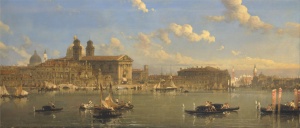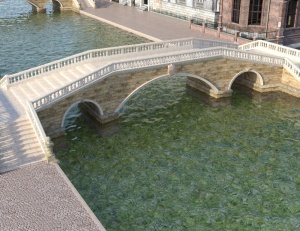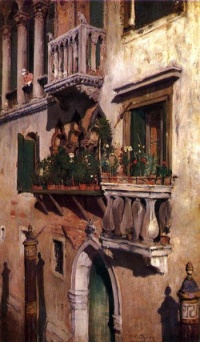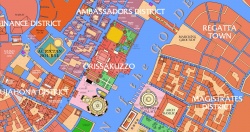Aurice
Aurice is the capital and namesake of the Noble Republic of Aurice and the seventh most populous city of the known world with 630,000 inhabitants. In the West, Aurice is third most populous after Trevirs and Bryndyd. The highest offices of the government of the imperial apparatus are found in Aurice as well as the government of the Aurician Metropolis. Historically and culturally, Aurice is considered part of Goscundy in Throvy, but it is administratively part of the Aurician Metropolis, a distinct political entity under the supervisory rule of the Noble Senate of Aurice.
Aurice rests upon a flotilla of islands connected by hundreds of bridges and criss-crossed by a network of canals called 'rivens' and for this reason has been amenable to a considerable merchant marine for many centuries. Aurician merchants are world-famous for traversing the World of Asdar, trading with Sungo, Opaz, Zephasia, Bahuna, and far-off Skaligdæ and thus creating a world-class emporium in the city proper. Today's skyborne merchants piloting titancraft-driven vessels have continued this tradition, circumnavigating the globe. Aurice is not only an imperial capital but a leading financial center of the Pallathantic and financial heart of the Aurician Empire.
Aurice traces its origins to settlement by Pallathantic fishermen about two thousand years before Salmakhamer. Archeologers tell us a little about what indigenous culture occupied the islands before the Pallathantic immigration, having found buried wares, pottery, and fishing tools. Archeology gives considerable evidence that Kalaman influence rose and fell with the fortunes of their rulers among the isles of the Addanine Sea. The islands of Aurice proper remained separate villages through the Midretassene and Yophenthean Periods until the fifteenth century when they united for mutual protection from sky piracy and sea raiders. After the collapse of the First Kalikán Empire, the ruling families formed a Senate that elected a duke to govern the city in 1417. Duke and Senate continued to rule and project the power of the mercantile metropolis into Goscundy and the rest of Throvy. With the invasion of uhlak tribes and other nomads, Throvy fell, economically weakening Aurice. Chaos wizards came forth and promised to stave off the marauders of the steppes. Prince Ulcanov through the turmoil of the Middle Ages of Chaos arose and became self-appointed tyrant of the city for about one hundred fifty years. The champions of the Fifth Isbajath slew him and overthrew his power, restoring self-government under the Senate. The city was subsequently ruled by Incarnandist Warriors, Medibgö (See Medibgóëse Empire), Thrace (New Kalikán Empire), House Bijäl, and finally under the aristocratic power of the Senate in 2627 as a result of the Aurician Revolution. The victors of the Battle of Aurice (2585) ensured the liberty of the city from the Gorcorumbese Empire during the Fifth Geddamin War. The power of the gentry and commoners rose in the twenty seventh century (2600's) and is invested in the Grand Provincial Chamber. Today Aurice occupies an immensely powerful position of rulership in the eastern Pallathantic which is contested by the rising might of the Adamantine Giants and partisans of independence in Erserce and eastern Corundy (Zamiria). Additionally, the increasingly powerful role of wealthy, international Corpora Mercia is displacing the pre-eminence of the Noble Senate and changing the dynamic of politics and international commerce. Aurice is a leading center for the development and production of titancraft technology.
Demography
Aurice has a population of about 630,000, ranking it third after Trevirs and Bryndyd in the greater Pallathantic Region. Municipal census reports indicate that in 2745, the city proper of Aurice, (not Aurician Metropolis), had 615,000 humans, 9,000 dwarves, about 5,000 halflings, nearly 500 elves, and 300 "other" persons. Of the humans, most are of Throvian extraction with significant minorities of Corundian and Ersercean provenance. Most Auricese claim to be Harmonist in devotion. Aurice has a very large Incarnandist community. Aurice has a small community of Imzaamis, the most famous of whom are attached to the Shagrela'alite diplomatic mission.
Thoroughfares of Aurice
Aurice rests on hundreds of islands joined by pedestrian bridges. This is very unconventional for cities of Asdar, although not unique to Aurice. Lugdunia is also a city of islets, canals, and bridges. In Aurice, a water channel is often called a riven and a walkway along a riven is called a fundament. Aurice is limited in size by the number of islands that comprise it. Every space on the islets is filled with palazzi, courtyards, small gardens, warehouses, homes, churches, sanctuaries, military barracks, guild schools, and towers. The broadest areas are for the minimal airfields for the Aurician navy and other VIP titancraft air vessels of significant size, due to the iron-willed determination of Grand Duke Stalcast Bijäl.
History
The islands of Aurice are thought to have formed from the ancient flow of the Ibrew River before the rise of sea levels when Magdeologers believe the mouth of the river was located immediately south of the islands of Aurice, just northwest of Azzunzirelo Town. The channel known today as the Golden Phœnice Riven is thought to have been one of the tributaries of the ancient delta of the river, now almost completely submerged.
Chronology of Aurice
For a complete sequence of events, see Chronology of Aurice. For a chronology of the Aurician Empire, see Chronology of the Aurician Empire.
Government and Administration
The Noble Senate of Aurice is the origin of all constitutional power over the city. The core islands of Aurice are part of the administrative entity known as the Aurician Metropolis which includes the islands of the Aurician Lagoon and the islands of the north perimeter of the Addanine Sea. These islands are divided into numerous vicifs. Each vicif is permitted to elect a magistrate called a vicevile who represents the needs and the concerns of the vicif before the magistrates appointed by the Senate. The municipal government consists of the body of viceviles, the Lord Mayor of the Metropolis, and the various city magistrates.
Districts
Districts of Aurice reflect the primary activity or the historic inhabitants of the given area of the city
List of Districts of Aurice
- Adventurers District (Aurice)
- Agogian District (Aurice)
- Ambassadors District (Aurice)
- Amurrigot District
- Apaludicho Mid Rent District
- Arathracian District (Aurice)
- Azzunzirelo Town (Traditionally part of city, but administratively part of the Metropolis)
- Berzilo Town (wealthy)
- Besbiaku Town (Old Blood District)
- Blavio District (High End Residential)
- Bromba Dwestini (Aurice) (Halfling District)
- Chazipostro Titancrafters District
- Colonial District (Aurice)
- Commercial Ship-Building District (Aurice)
- Corpora Mercia District (Aurice)
- Chelissa Yolán District (Courtesans District)
- Craftsfolk & Machinists District
- Ekertilluno Gaming District
- Ersercese District (Aurice)
- Fathersayers District (Aurice)
- Finance District
- Fishing District
- Gachundo Low Rent District
- Galdimisikhuba (Galdimesan Archguild School of Aurice, etc.)
- Gallivo Shipping District
- Gidonililo Town (Saint Gidhoniel) Nicknamed "Lilo"
- Gosimín Riven District (High End Tailors & Garment District)
- Dambin Urthúnva District Grand Navy District
- Grespuelondio (High End Shopping District)
- Half-Orcs District
- Healers District
- Achuvizol High Captains (Nouveau Riche) District
- Ibrevese Boatmens District
- Ilzepurdo District
- Imustilo Shipping District
- Imustilo Warehouse District
- Imzaami District
- Incarnandist District
- Jaugetumbo District "Great Jib" District
- Jospin (Old Booksellers District)
- Kammiaddo Mid Rent District
- Karivia Town District
- Kawchi Merchants District (Aurice)
- Khaido Town, part of Dwarven District of Aurice
- Kebinzo Amurrino "Isle of Amrulon" or the Amrulonium
- Kumavinchilo Town
- Lambrija Shipping District
- Lambrija Warehouse District
- Lamikoko (Aurice) Art District (Artists, Art Schools, Auction Houses)
- Little Corundy (Aurice)
- Little Ithatia (Aurice)
- Little Oliblish (Aurice) (Incarnandist)
- Little Sardeichs (Aurice), part of Dwarven District of Aurice
- Little Tauhad (Aurice), part of Dwarven District of Aurice
- Little Thrace (Aurice) West Half Lodging District
- Lodging District
- Magistrates District
- Mazorijo-Chekopio-Zaffo Low Rent District
- Mazorijo-Strogin Low Rent District
- Mercenary District
- Mijolio (Low-Rent Warehouse District)
- Mujahona District (High Rent District, divided into west, mid, and east)
- Narsadese District
- Naval Ship-Building District
- New Booksellers District
- Ojevidorsin Theater District (Aurice)
- Orissakusso (Gubernatorial Palace and Temple of the Golden Phœnice)
- Perraldiki District, Merchant Lords, but most not Metropolitans
- Ponjolio Wharves District
- Prazzimimo Ship-Building District
- Priests District
- Regatta Town (Aurice) (west of Kadraskan Bridge)
- Restaurant District
- Sailors District
- Scholars and Wizards District
- Sea Navigators District
- Skapadimo Manufacturing District
- Skygazers District
- Skymens District
- Skyport District
- Toviache Slums District
- Spell-Casters District
- Sporting District (Gibgibsews)
- Student District
- Sumia Lanchidda District
- Tassan District (Aurice)
- Temple District (Aurice)
- Textiles District (Aurice)
- Zarospidin District (Titanship Manufacturing District)
- Torroso Shipping District
- Vadhiyo Shipping District
- Vimalian District (Aurice)
- Wine Merchants District
- Yojilo Town
- Yazimín Orissanusso District
- Zakhaio (Aurice) (Thracian District)
- Zamirite District (Aurice) (Little Zamiria)
Vicifs
Vicifs are administrative districts of Aurice and the Aurician Metropolis. The list below only has the thirty two vicifs for the city proper. Each vicif of the city proper has a vicevile who represents it to the Noble Senate. The vicevile is typically chosen by the gentry men of the district.
List of Vicifs of Aurice
| Vicif Name | Demonym | Vicifhouse | |||
|---|---|---|---|---|---|
| Achuvizol | Achuvizoltan | ||||
| Astinumo | Astinumotine | ||||
| Baliasso | Baliasson | ||||
| Berzibo-Grespuelondigo | Berzibo-Grespuelondigon | ||||
| Dambi-Chakva | Dambi-Chakvan | ||||
| Damionsin | Damionsinet | ||||
| Erserchilombo | Erserchilombon | ||||
| Galdimisibo | Galdimisibon | ||||
| Ibriavodio-Fomio-Zaffo | Ibriavodio-Fomio-Zaffotin | ||||
| Ichegusto | Icheguston | ||||
| Imustilo | Imustilon | ||||
| Inchego | Inchegon | ||||
| Iprolio Jakusti | Iprolio-Jakustigon | ||||
| Jaugetumbizo | Jaugetumbizan | ||||
| Jontevun | Jontevunan | ||||
| Jospin-Garveluzo | Jospin-Garveluzon | ||||
| Jukigo-Bromba Zaffo | Jukigo-Bromba Zaffot | ||||
| Lagupritiuna Zaffo | Lagupritiuna Zaffon | ||||
| Lambrija | Lambrijan | ||||
| Liluna | Lilunan | ||||
| Mujaha Drakuba | Mujaha-Drakuba | ||||
| Mujaha Gesi | Mujaha-Gesin | ||||
| Purdo-Zakhyá | Purdo-Zakhyán | ||||
| Shalimo-Yojilo | Shalimo-Yojilon | ||||
| Shalimombo Guzya | Shalimombo Guzyan | ||||
| Sharrako | Sharrakon | ||||
| Titovo-Zarospidin | Titovo-Zarospidinigo | ||||
| Torroso | Torroson | ||||
| Toviachego | Toviachegon | ||||
| Vadhiyo-Godo | Vadhiyo-Godon | ||||
| Vakuzvat | Vakuzvatane | ||||
| Visparin | Visparintine |
Transportation
Foot transportation and water vessels are the traditional means of communication in the city. Water vessels for personal transportation consist mostly of the gondolas. Wealthy families and Corpora Mercia own their own gondolas and the gondoliers are their employees. Everyone else hires a gondolier much like a taxi. Aerobarge transit has become vital to the city and there are eight private lines regulated by the municipal government. The aerobarges are required by law to fly over the sea or the largest rivens. Historically, there were windbarges that provided transportation, but they have all been replaced by the aerobarge lines.
Horses and Galimshara
Horses, galimshara, and other mounted beasts are generally illegal to use in Aurice, particularly in the streets. Aurice outlawed the use of horses and other beasts in the twenty-fourth century (ca. 2380). For this reason, the boat and the aerobarge are the only means of intra-city transportation. It is legal to have a horse or a galimshara transported by barge to the city and then kept in special stables created for this purpose. The stables must have direct access to the watercraft on the water.
However, the Noble Senate has awarded a very small list of persons with the right to ride a horse on the public thoroughfares of the city. The privilege of riding on horseback or in a horse-drawn carriage is also extended to visiting Heads of State and foreign ambassadors. The privilege of riding on horseback is not generally extended to members of their staff or families to ride so by themselves, so most heads or state and ambassadors who make use of this privilege prefer a horse-drawn carriage. In the past twenty years (2720 to present), visiting heads of state have with few exceptions ridden in the Golden Barge of the High Phœnissa.
Key Sites
The imperial city of Aurice offers numerous historic sites. The head of the imperial apparatus, offices for some of the largest corpora mercia in the Pallathantic, and numerous religious temples may be found in Aurice.
Aurician Bourse
The Aurician Bourse is the imperial marketplace for pledgefasts for Corpora Mercia. Numerous deftcantors can be heard selling pledgefasts. Deftscribes record all the transactions.
Basilica of Saint Gidhoniel
Built in 2513 in what is now Calchamas Court in Aurice, the Basilica of St. Gidhoniel commemorates the victory of the Tisbajah Gidhoniel kab S'ephah who slew Prince Ulcanov, the wicked Chaos Ruler of Aurice. The Basilica today continues to serve as a law court with scheduled days of Incarnandist Worship. Reliefs inside the basilica depict scenes from the life of the saint and scenes from the local Incarnandist community, including the construction of the basilica.
Calchamas Court
Citadel of the Palatine Guard of Aurice
Court Bijäl
Archbasilica
The Archbasilica of Aurice rests to the east of the Senatorial Palace. It was first built in the 16th century to replace the old Yophenthean law courts that were well over a thousand years old and then subsequently expanded in the 18th century. The basilica was rebuilt from the ground up in 2562 to 2567 during the rule of Ducal Viceroy Baimund Kaligär according to a completely new architectural program. This is essentially the building that moderns recognize today. It was restored in the late 27th century by the authority of the Senate. The Archbasilica houses the senatorial offices and the offices of the various ministries and magistrates of the senatorial government.
Gubernatorial Palace
Magitechnic Institute of Aurice
The Magitechnic Institute of Aurice is comprised of two large buildings and several ancillary buildings, including dormitories. The Citadel and the Arcanistry Lab are the greatest structures, along with dormitories and other facilities.
Palace of Corpora Mercia
The Ministry of Corpora Mercia is housed in the Palace of Corpora Mercia.
Presidium of the Republican Guard
Senatorial Palace
Temple of the Golden Phœnice
Theater District
Lodging and Dining Establishments
As a great cosmopolitan center, Aurice is home to hundreds of taverns and lodging establishments which cater to a wide variety of clients of various means. The eastern edge of the city around the Ugorth Dragonrail Station is well known for the most costly and extravagant of inns and taverns.
Markets
- Beast Market
- Chaspevigo (Fish Market Aurice)
- Gondola Market
- Goscunds Market
- Half Downs Cow Market
- Palace Talverno Commodities Exchange Market (Aurice)
- Pearl Market
- Tajiskesi Kawchi Market
- Vegetable Market
- Visparin Pig Market (Aurice)
Economy
Aurice is located at the mouth of the Aurician Lagoon and is a gateway city by means of the Ibrew River to the near interior of Asdauria. Aurice is a key entry point into the Pallathantic for many luxury goods from the far east, including illegal euphorium. By virtue of the empire's control of Agogia and Bijälenland, the Aurician Bourse is the leading center for trading such commodities as panox. In combination with Aurice's control of the Grand Shadew Canal, the city is the mistress of the eastern Pallathantic. Additionally, Aurice is the leading human manufacturer of titancraft and competes fiercely with dwarven titancraft manufacturers. Aurice controls the lucrative panox deposits of Agogia and Bijälenland.
Corpora Mercia
The headquarters of about fifteen major corpora mercia are found in Aurice.
List of Aurician Corpora Mercia
- Aurician Zephasian
- Drakes of Aurice (financial, insurance)
- Merchant Aviator Industries
- Metropolitan Skycrafters
- Onchese Industries
- River Shadew Industries
- Shadevan Air Combine
- Sungo Company owned by Samoyat Rhaurvace
- Thrynnish Blacksmith Industries
- Thuskan Guard Combine
- Titancraft Industries of Aurice
Institutes of Higher Learning
Galdimesan Archguild Museum of Aurice
Festivals and Commemorations
Aurician holidays may be divided into three kinds, state, major, and minor. State observances require all non-essential municipal and city offices and services to be closed. State holidays have some great significance to the state. Major holidays are usually religious and observed by a majority or a large segment of the inhabitants. Minor holidays have a small base of observers, but may be very significant culturally or may have a long standing history of observance.
Games of High Summer
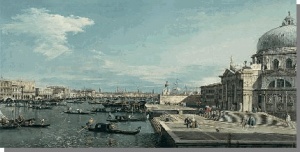
No doubt can exist in the mind of any Aurician that the Games of High Summer on the first day of the common year (Summer Solstice) are the most anticipated throughout the prior year. The city becomes packed with provincials and foreigners who must book their lodging often as least a year in advance. Municipal Gendarmes detest the day and are famous for all manner of excuses to be found on holiday. All manner of amusements, races, and gambling on the races take place. Aurician game riots have become legendary. The rivens and fundaments of the city swell to an unbearable mass of rowdy crowds, particularly around the main riven, Golden Phœnice Riven, where the teams of gibgibsews and their riders gather for the great games. Skar is the most popular of the public entertainments and the Imperial Skar Pennant takes place around noon. The sky-yacht regatta begins in the late morning, pauses for the Imperial Skar Pennant, and resumes in the afternoon.
St. Iphimba's Day
The day of Incarnandist Saint Iphimba of Aurice is honored on Mistmoon 12 which is during Autumn. The day originally honored Saint Iphimba and other Aurician children who died under the sick cruelty of the Dark Prince but has come to be a day to remember all children and infants suffering anywhere. It is a minor holiday and often an occasion for civic leaders to discuss social justice for vulnerable members of society.
Crime
As you may expect in a large and dense urban place, crime is an ongoing challenge for the municipal government. Pickpocketing is not uncommon especially on tourists during high traffic festivals and especially the Games of High Summer when the best pickpockets make enough money to subsist for the rest of the year.
Organized Crime
Three families are widely acknowledged as controlling all major criminal activities in the city of Aurice and the Aurician Metropolis. They are House Rhaurvace, House Satrimona, and House Tispuva. Additionally, the dwarven matron, Khalidzhé of Sakha, is the informal head of the dwarven district of Aurice which is thought to be involved with criminal activities within the dwarven district as well as several legitimate industries. These families deal principally with the trade of euphorium, weapons, mercenaries, racketeering, protection money and extortion, gaming and prostitution, and the sale of unlicensed printed materials. Any thieves guilds of the city are under the control of one of these three families or the dwarven district. The three families generally respect the autonomy of the two vicifs that comprise the dwarven district of Aurice. Despite their competition, the three families typically cooperate and avoid internecine conflicts, preferring to resolve their differences by agreements or if necessary conflicts through secondary agents outside of the city of Aurice.
The crime families do not tolerate general lawlessness and have been known to work with the Aurician gendarmerie for the prosecution of some crimes. They have a reputation of no tolerance for chaos cults or worship, especially among their own and it is thought this is one of the reasons the ruling Noble Senate tolerates them. Indeed, if the chaos worship and practices of an individual member of the elite are discovered to one of the crime families, he will quickly find himself obliged to pay protection money to the family to ensure his ongoing privacy. It is unnecessary for the crime family to eliminate the chaos cultist directly as with adequate proof, the state will prosecute and punish the offender in accordance with existing law, bringing shame to the offender's family.
Customs
Aurician Broge
The broge is a time for the household to relate the events of the day in an informal and relaxing setting away from the concerns of business. The broge is enjoyed at 21 o'clock in evening, sometimes an hour earlier and rarely an hour later, depending upon the needs of the family.
Map
Aurice City Map ©2019, 2020 Kraig Hausmann, All Rights Reserved
Sources
 Primary Sources
Primary Sources
 Secondary Sources
Secondary Sources
- From the Fifth Isbajath to the Fifth Geddamin War: The Transformation of Early Modern Aurice, 2702, Danax Aistaga
- History of the City of Aurice, 2591, Adras Charrusi
- Remembrances of Our Antique Customs, 2692, Chemor ennekhá Didio Shunjimmo
- Zafayat’s Guide to Gastronomy of High Aurice, 2714, Zafayat
See Also
- Aurician Empire
- Aurician Funeral Customs
- Aurician Metropolis
- Aurician Social Classes
- Aurissa
- List of the Rulers of Aurice
- List of Sites in Aurice
| This article is a stub. It requires further development by the creator. |
